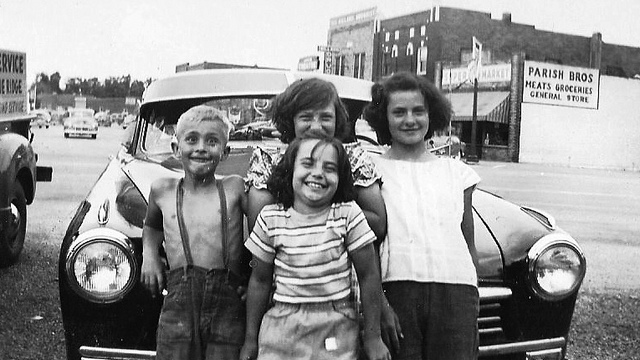My mom was extremely pragmatic—the complete opposite of a helicopter mom.
She was a single woman who had eight children and spoke zero English. We lived in a six-story building in the South Bronx after my father left her. My mother worked in a factory six days a week and left my care, her youngest, to my older and reluctant sister who was then a teen.
For many reasons including being a single parent, poor and uneducated, my mom was all about independence in her children. She also is the smartest woman I know. Even with all my education, my mother’s intellect and reasoning far exceeds mine in many areas. When my son was born she looked at the mound of parenting books on my table and and sternly said, “For God’s sake, throw those out, you will not learn how to be a parent from those books. Trust what you know and what you yourself have learned about life.”
My mother taught us all, including my brothers, how to cook, clean, and take care of a home. We could all run a home if she was working, or as she always said, “in case I’m gone one day.” She taught me how to look both ways on the street by the age of four in order to be able to run small errands for her at the little grocery store. She would not let me enter school without knowing how to tie my shoes. I knew how to make change before I started going to school, and make sandwiches.
As an older mom—she had me at 45—she worried about not being around to care for us. Thus, her education on pragmatic life lessons began. I remember being eight years old and reading my school grades to her. I was a disciplined student as I was fearful of disappointing her, or even worse, a teacher calling her and telling on me. My mother saw no place for disrespect, laziness or lack of responsibility. As I read my grades to her, she looked at me with a soft but intense look and said, “I cannot help you. I don’t speak the language, and I don’t know anything about what you are learning, but I expect you to work hard and do what you have to do. You are a good girl and need to own your own future.” I was eight.
I remember as an adult thinking that I wanted to be a different kind of mom—the kind who stayed home, baked cookies, did homework, and went to every school event. I am not sure why I thought that her parenting was not good enough. My mother was a wonderful, loving and present parent, in her own way. She worked a lot but one of my fondest memories was our once-a-week lunch date at the Woolworth lunch counter, sharing a milkshake as she spoke to me like she would to any other person. I understood that this was a huge deal as she had little money. It was not until much later when my son was grown that I understood the gift of independence, resiliency, gratitude and the ability to cope that my mother had given me. It was the ultimate act of love for it required her to trust that we would be okay.
More than anything, I now realize just how much she loved us. She took the time and patience to teach us necessary life skills that would carry us in life, especially when times got hard. I believe that she made a conscientious effort to give us the resources we would need to have successful futures. Those resources were within us and she knew and trusted that we were more than capable of handling it.
Though I practiced some of those same pragmatic skills with my son, I only wish that I had started earlier in his life.
As a school Social Worker, I see an increase in anxiety in children, the lack of coping skills, and an attitude of false entitlement. But mostly, I see children who suffer unnecessary sorrow, low self-esteem and anxiety because they lack the skills to cope with small and big changes. As a therapist and a mom it crushes me. Sadly, in the 16 years I’ve been working the problem has grown and is not getting better. Often these problems evolve into behavioral issues because the children do not possess the skills needed to navigate their feelings and situations.
Below are some basic parenting strategies that I share with the people I work with:
>>Loving them doesn’t mean doing everything for them. Let them explore, do and try before jumping in to help.
>>No child has ever imploded from being told, “no.”
>>Teach responsibility at home and school by cleaning up toys and doing small chores to help the family, and by having them be accountable for school assignments.
>>Don’t be afraid to let them help make snacks, and even small easy meals.
>>By the age of 12 they can start doing their own laundry, even if they haven’t mastered folding.
>>Teach acceptance of circumstances, rules, and changes. They learn to cope when things don’t always go their way.
>>Get them outdoors; limit screen time, iPad, television, computers and video games. Children learn best in their natural environment.
>>Bumps in the road and knees are not a bad thing. It teaches them fortitude and that they are strong.
Children with good coping skills, conflict resolution, and good practical life skills have higher self-esteem, greater independence, less anxiety and a much higher ability to cope with difficult situations. All of these things lead to happier kids who do better in school, have healthy relationships and have a more positive outlook on life in general.
School personnel are there to encourage, teach and guide them, but the foundation in which our children will stand firmly as they grow into adults, will be the one we, as parents, helped them build. I will always be grateful to my mother for the tears she let me shed, and for her fierce need to teach me that I could handle it all with or without her.
Trust me and mostly yourself: Our children are so much more capable than we give them credit for.
~
Author: Maria Arroyo Fazio
Image: Flickr/Shannon White
Editor: Travis May
Children’s Day:









Read 5 comments and reply